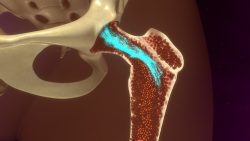 New research from the University of Cologne has found that stem cell function reduces as we age due to changes in our epigenome. Because our bones become thinner as we age, fractures and bone diseases occur more often. One reason this may happen may be impaired function of bone-marrow stem cells, which are necessary for bone maintenance integrity.
New research from the University of Cologne has found that stem cell function reduces as we age due to changes in our epigenome. Because our bones become thinner as we age, fractures and bone diseases occur more often. One reason this may happen may be impaired function of bone-marrow stem cells, which are necessary for bone maintenance integrity.
The team wanted to know why these stem cells don’t produce as much material for developing and maintaining bones as a person ages, which can cause more fat in the bone marrow to accumulate. To find out they compared the epigenome in bones of young and old mice.
They found that the epigenome can change naturally with aging. The genes that are significant for the production of bone are especially affected. The epigenome had differences that were from proteins called histones. Histones combine the DNA in cells controlling access to DNA and make certain genes active or inactive. Histone modification in stem cells reduces over time which lowers activity of bone forming genes.
The research group studied the epigenome of mesenchymal stem cells. These can be found in a person’s bone marrow and can produce cells of different types such as bone, cartilage and fat cells. This was to find out if the change in the epigenome might be a cause of higher risk to osteoporosis or bone fractures in humans. Older aged patients with osteoporosis had presented the same epigenetic changes as they had noticed in the mice.
They wondered if the epigenome stem cells could be rejuvenated. They used a nutrient solution that contained sodium acetate to treat isolated stem cells that were from mouse bone marrow. The result was the cell converting the acetate into a sequence where the enzyme attaches to histones which can promote access to genes, thus increasing their activity. This successfully rejuvenated the epigenome which improved the activity of the stem cells and led to a higher accumulation of stem cells.
They did note that treating osteoporosis with the form of sodium acetate that is a food additive is not advisable since their observation of certain cells was very specific. But stem cell therapies for treating osteoporosis are currently being undergone. It may be possible to use sodium acetate in these cases. More research is needed to determine the outcome on the whole organism to reduce possible side effects and risks.
To view the original scientific study click below:
Chromatin remodeling due to degradation of citrate carrier impairs osteogenesis of aged mesenchymal stem cells





